Back on October 4, Vincent Reinhart wrote in The New York Times’ Deal Book that despite all the political maneuvering currently going in Washington the contingencies to prepare for a default are “a waste because the United States government is not going to default, ever.”
Reinhart argues that government officials will be forced to violate one of three laws or constitutional mandates:
- The Second Liberty Bond Act of 1917 that establishes the debt ceiling;
- The Federal Reserve Act that prohibits the Fed from lending directly to the Treasury; or,
- The 14th Amendment of the Constitution, which holds that the debt of the United States government, lawfully issued, will not be questioned.
Finally, of the consequences, Reinhart writes:
An official anticipating stretching the law ranks alternatives by precedent, punishment as specified in the law and standing as to who can claim a violation of the law. Either a secretary of the Treasury who holds No. 3 as the overriding instruction or a chairman of the Federal Reserve who waives No. 2 saves the global financial system and, at most, risks being impeached or fired. That seems to be a reasonable risk and reward trade-off.
That, however, ignores the real nightmare that would happen immediately after any of those actions were taken to avoid default by the United States Government.
First, let us take impeachment off the table. Yes, the House of Representatives might well decide to attempt impeachment against President Obama, Treasury Secretary Lew or Federal Reserve Chairman Bernanke. Yes, it might even pass impeachment on a party line vote that sees 218 or more Republicans vote for one or more articles. It does not matter because any impeachment would then go to the Senate, where it would be dead on arrival. The only question there is whether the Senate would go ahead with the formalities of a trial before voting for acquittal or simply acquit immediately.
Now, let us get into the real nightmare. The moment that any action was taken by Treasury or the Federal Reserve there would immediately be a lawsuit seeking to nullify that action. Simply put, we would see an attempt to use the courts to uphold the constitutionality of the debt ceiling and declare invalid all actions that violate the statute in question.
Think about that for a moment or two. We would have the entire world waiting to see whether the courts would throw the government of the world’s largest economy into default. We would have debt issued by the United States Government where investors would be unsure of its validity. We would have a world thrown into chaos because the world’s economic system is based upon the premise that debt issued by the federal government is, effectively, a risk-less investment that is as good as actual money.
For weeks, or months, the world would watch courtrooms in the United States and wonder what would happen. The world would already likely be back in recession by this point and already-slow recoveries would have ground to a halt. We would now be seeing whether we would be headed for a new global depression and economic chaos. Ultimately, it would come down to nine unelected justices on the Supreme Court who would decide the fate of not only the United States, but of the world.
That is the real nightmare of extraordinary measures. That is where House Republicans are taking us.

25 comments